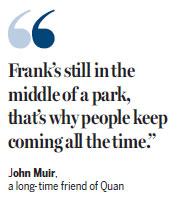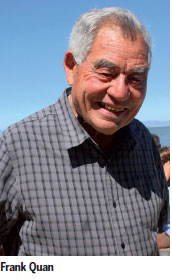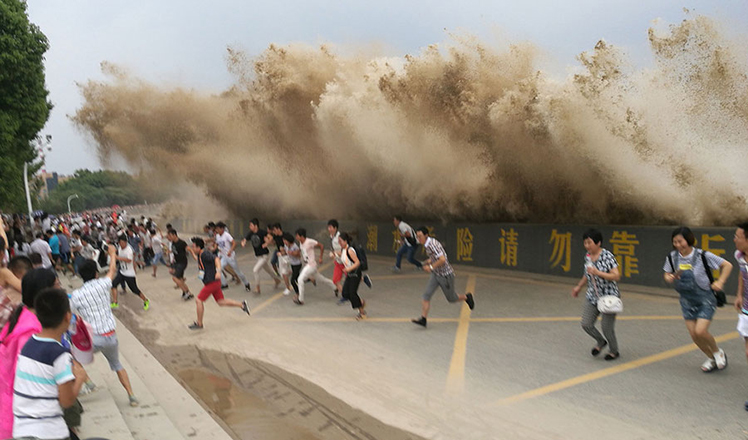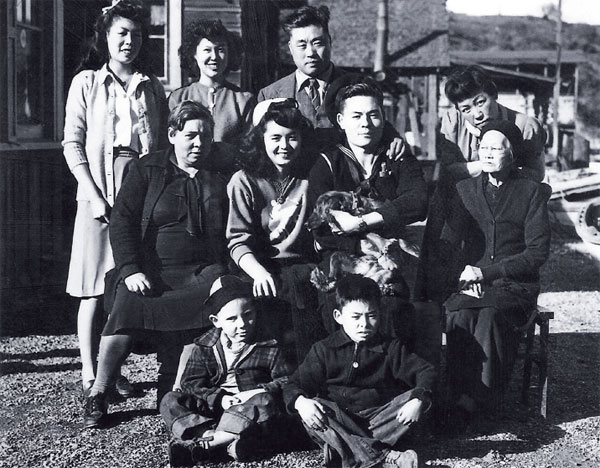Last of the Chinese shrimpers
Updated: 2016-09-09 11:36
By Lia Zhu(China Daily USA)
|
|||||||||
|
Frank Quan (third from left, sitting) and his family at China Camp. Courtesy of Friends of China Camp |
He said he was "just"' a fisherman in the last shrimping village on the northern shore of San Francisco Bay. To those who knew him, Frank Quan was a story teller and someone who represented the "living history"' of China Camp Village, Lia Zhu reports from San Francisco.
The sun pokes through the thin clouds on a fresh, warm afternoon. An old man, in a checkered shirt and jeans, strolls along the quiet beach, gazing at the long pier.
That's the image of Frank Quan frozen in the memories of many people. The last resident of the last Chinese shrimping village on the northern shore of San Francisco Bay died on Aug 15, 10 days before he would turn 91.
Born in 1925 in China Camp Village, except for a stint in the US Navy during World Wall II, Quan lived his whole life in the village established by Chinese immigrants.

In the middle of China Camp, now a state park, there are a few wooden shacks that were part of Quan's life - a general store and a caf he ran.
"It's bittersweet," said Heidi Kuhn, the daughter of a childhood friend of Quan, who had visited him two days before he was found dead in his bedroom. "Frank told me 'I'm just a fisherman but my life is complete. He was content having told his stories."
Quan never married and had no children, but he had many friends from China and Europe.
"Last month, Frank told me excitedly that he saw some new visitors who had never come here before," said Ed Lai, chairman of Friends of China Camp, a non-profit organization that operates the state park.
Calling Quan a "living history of China Camp", Lai said he played an essential role in preserving the historic village and transforming it into a state park.
One stipulation
The 36-acre village was donated by a developer to the state of California in the late 1970s but with a stipulation: Quan was to have life-long residency in the area as a living memorial to the history of Chinese Americans in the Bay Area.
"Frank's still in the middle of a park, that's why people keep coming all the time," John Muir, a long-time friend of Quan and a board member of Friends of China Camp, told a radio news program years ago.

The park faced closure by the state's park department in 2011 because of a lack of funds. Quan helped save it by joining the group's board members, raising money and doing media interviews.
"I saw an elderly lady shed tears at a fundraiser because it reminded her of her childhood moments when her mother took her to buy shrimp at the beach," said Lai.
The group raised more than $300,000 in six months and entered into an agreement with the state parks department to operate the park.
"Now we have around 300,000 visitors a year. More and more visitors from other parts of the US and other countries come because they read the stories of Frank," said Lai.
Living alone in his 80s, without modern equipment and a facility, was not easy for Quan.
"Two years ago, I saw Frank, who was 88 then, working alone on the roof. I often saw him maintaining the buildings and machinery," said Lai. "But I think he was rather happy and comfortable. He had no worries."
"Friends will remember him as a gourmet who loved to share spirits and a great meal in the yard of his home," read Quan's obituary.
Kuhn said she still remembers going to China Camp with her father and ordering a shrimp cocktail when she was a child. Her father, Bob Thomas, three years Quan's junior, went to the same high school with Quan, and the pair remained close friends.
"That was good - the baby shrimps of California," she said.
Quan's friends said he still went shrimping in his last days, and served shrimp salad and clam chowder to visitors in the historic caf on weekends, just like his mother and aunt had done since the 1950s.
His smile
"People from all over the world will remember that," said Kuhn. "They'll remember his smile, the most beautiful welcoming smile."
Like China Camp, there were more than 20 fishing villages around San Francisco and San Pablo bays that flourished in the 19th and 20th centuries, but all of them except China Camp faded away after the passage of anti-Chinese laws and World War II.
Thanks to Frank, the essential community spirit and historic way of life of his family was kept alive.
Frank Quan and others cherished the past and worked hard to preserve the history of the early Chinese in America, said Gordon Chang, a professor of American history at Stanford University and director of the Center for East Asian Studies.
"Because much mainstream historical writing omits their history, it is imperative that we, descendants of the early Chinese, do not," said Chang, who since last year has been leading a Stanford project to preserve the history of the Chinese railroad workers of 150 years ago.
- Three women planning 'imminent' attacks arrested in France: minister
- China, Britain vow to deepen military exchanges, mutual trust
- British parliament to debate second Brexit referendum petition
- Chinese women find their way through the glass ceiling
- Rousseff leaves presidential residence in salutation
- Thousands of Chinese rally in Paris to call for 'security for all'

 Sights and sounds of Premier Li's visit to Laos
Sights and sounds of Premier Li's visit to Laos
 Yao Ming and Class of 2016 receive Hall of Fame jackets
Yao Ming and Class of 2016 receive Hall of Fame jackets
 Bullet train attendants strut new look in Xi'an
Bullet train attendants strut new look in Xi'an
 Ten photos from around China: Sept 2 - 8
Ten photos from around China: Sept 2 - 8
 Turning mud into work of art
Turning mud into work of art
 Unforgettable moments of Premier Li at ASEAN meeting
Unforgettable moments of Premier Li at ASEAN meeting
 Six policy signals China sent at G20 Summit
Six policy signals China sent at G20 Summit
 'First Lady table ware' a hit in Hangzhou
'First Lady table ware' a hit in Hangzhou
Most Viewed
Editor's Picks

|

|

|

|

|

|
Today's Top News
Trump outlines anti-terror plan, proposing extreme vetting for immigrants
Phelps puts spotlight on cupping
US launches airstrikes against IS targets in Libya's Sirte
Ministry slams US-Korean THAAD deployment
Two police officers shot at protest in Dallas
Abe's blame game reveals his policies failing to get results
Ending wildlife trafficking must be policy priority in Asia
Effects of supply-side reform take time to be seen
US Weekly

|

|










